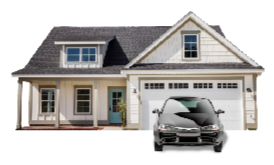Homeowners insurance can help you ease the financial burden of repairing or rebuilding your home and replacing your belongings after certain commonplace disasters — like a fire, lightning strike, tornado or even a break-in.
It also can help cover your costs in a lawsuit over an injury or property damage. With fast claims payments and multiple discounts available to help you build an affordable policy, find out why Farmers® home insurance is a smart choice.
Ways to save on homeowners insurance

Bundling home and auto
Bundling your homeowners and car insurance policies with Farmers could save you 10% or more, depending on where you live. Adding other policies may save you even more.

Home insurance discounts
Find more ways to save on home insurance based on your home, your policy and where you live.

Save with leak detection
Find out how you can earn a discount and help protect your home against water damage, including losses that may not be covered by home insurance.
Additional savings on home insurance
Learn more smart ways to save, from paying in full to installing a security system or fire alarm.

Homeowners insurance coverages
If choosing coverage starts to feel like solving a puzzle, think of your Farmers agent as an insurance coach — someone who can help you understand the options so you can confidently choose the coverage and price you want. These are the most common coverages in a home insurance policy.
Personal property coverage
Personal property coverage helps you repair or replace your personal belongings if they are stolen or damaged.
Example: Burglars break in and make off with your computer, jewelry and mountain bike. Depending on the type of coverage you select, this coverage could help you pay the cost of replacing them.
Personal liability coverage
Personal liability coverage can help pay costs if you’re responsible for accidental property damage or bodily injury to others.
Example: If your teenager accidentally hits a ball through a neighbor’s window, this coverage could help pay for a new window. Or if a guest slips on your icy sidewalk and hits their head, the coverage could help with medical bills and even legal bills from a lawsuit.
Dwelling coverage
Dwelling coverage helps you pay for repairs to your home and structures permanently connected to your home if an unexpected event that’s covered by your policy, such as a fire, windstorm, lightning or hail, causes damage.
Example: High winds topple a tree onto your roof. This coverage could help pay for roof repairs or a new roof. Tree removal may also be covered.
Loss of use coverage
Loss of use coverage, including additional living expenses, can help you pay to stay elsewhere if you can’t live at home because of damage caused by a covered event.
Example: Extensive repairs are needed after a fire guts your home. This coverage could help you pay to rent a home, condo or apartment while repairs are made, as well as reimburse temporary costs, like temporary internet service or increased commuting costs.
Water damage coverage
Certain, but not all, types of water damage are covered in a home insurance policy. If a leak is sudden and accidental, it’s generally covered. But flooding is not.
Example: If an appliance springs a sudden leak and water damages your floors, the damage is usually covered (unless poor maintenance was the cause). But if a sewer overflows into your basement, a homeowners policy typically does not cover repairs.
Other types of coverage
Medical bills
Medical payments to others coverage provides limited coverage for medical costs if someone outside your household is injured on your property, no matter whose fault it is.
Example: If a neighbor’s child breaks his arm while playing in your yard, this coverage could help pay for the trip to the emergency room.
Guaranteed replacement cost
In a time of escalating construction costs, if you have a covered loss, this optional coverage guarantees payment for the full cost to repair your home, even if it exceeds your policy limits.
Example: A tornado rips through your home, requiring a full rebuild. Your dwelling limit is $250,000 but lumber and construction labor push rebuilding costs to $300,000. This coverage can pay the difference.
Umbrella coverage
Personal umbrella insurance provides additional liability coverage, in $1 million increments up to $10 million, over the liability limits in other policies you already have and for unusual risks that aren’t covered by your other policies. It can help protect your assets from lawsuits.
Example: A guest trips over a toy your child left in a hallway. He won’t be able to work for some time due to the injury, and the liability limits of your home insurance may not be high enough to cover his medical bills and other compensation. Umbrella can help cover the difference.
Learn more about all types of home insurance coverage.

How to get home insurance
Getting a homeowners policy starts with getting an accurate home insurance quote. Here’s what you need to know.

Start early
If you’re taking out a mortgage on a new home, you’ll need to get home insurance before closing the deal. Closing typically takes about a month, which gives you time to find a policy.

Gather the information you’ll need
Have this information at your fingertips to help make the quote process quick and easy.
About your house
- Address
- Mortgage information
- Exterior and interior materials, like siding, roof and flooring
- Year built
- Square footage
- Number of stories
- Foundation type
- Garage size
- Other structures (sheds, fences)
- Type and age of HVAC system

Consider how much insurance coverage you want
- Calculate rebuilding cost (different from market cost)
- Estimate the value of your possessions
Why choose Farmers for homeowners insurance?
Our agents’ customer service starts even before you’re a Farmers customer, while you’re shopping coverage — and their know-how can help guide you to the insurance you want. We back that up with nearly 100 years of fast claims payments.
Explore home insurance in your state
Find up-to-date information about homeowners insurance in your state.
How much does homeowners insurance cost?
The average premium for an HO-3 policy, the most common homeowners policy, is around $1,181 per year for a package (including dwelling, property and liability coverage) with limits in the range of $200,000-$299,000, according to a December 2023 report from the National Association of Insurance Commissioners.
But costs can vary widely depending on many factors, including where you live, the type of home you live in and how much coverage you choose.
How to prevent a non-renewal
Keeping up with home maintenance can help you qualify for a policy renewal. That means cleaning leaves off the roof, pruning trees away from the house and repainting where needed, for example. Also, let your insurer know if you’re remodeling, changing the use of your home or making other changes that could affect its value.
Commonly asked questions about homeowners insurance
What is homeowners insurance?
When certain sudden, unexpected disasters strike, like a fire or burglary, homeowners insurance can help you with the cost of repairing or rebuilding your home and replacing your belongings. It also can help with expenses if you’re responsible for accidental property damage or bodily injury to others.
What does homeowners insurance cover?
A standard homeowners insurance policy usually covers damage to your home and your property caused by various perils explained in the policy. Typical home insurance policies cover damage caused by:
- An aircraft, car or other vehicle
- Explosions
- Falling objects
- Fire and smoke
- Lightning strikes
- Theft
- Vandalism and malicious mischief
- Some types of water damage
- The weight of ice, snow and sleet
- Windstorms and hail
Is homeowners insurance required?
Home insurance is not required by law, but if you have a mortgage, your lender can require you to have insurance until the loan is paid off.
And there are other reasons to insure your home. The average cost of repairs after a kitchen fire was $12,900 in 2024, but costs can range higher depending on how far the flames spread. If a guest slips and falls and you’re at fault, medical and legal costs plus lost wages can add up. Home insurance can help.
How much homeowners insurance do I need?
One way to estimate how much home insurance you might need: multiply the total square footage of your home by per-square-foot building costs in your area. (A local real estate agent, contractor or builders’ association should be able to give you a ballpark amount of local building costs.)
In addition to estimating the cost to rebuild your home, consider how much it will cost to:
- Replace your belongings
- Defray additional living expenses if you can’t live in your home
- Protect your financial assets if you are sued
Learn more about home insurance in your state.
Are pets covered under home insurance?
Some damage or injuries caused by a pet may be included under the liability coverage in your homeowners insurance policy. (Some costs related to taking care of a sick or injured pet can be covered by pet insurance.)
Does home insurance cover flooding?
Flood damage from rain, overflowing rivers and other water that enters your home from outside typically is not covered by a standard homeowners insurance policy. However, a separate flood insurance policy can help you get the coverage you want. Your home insurance policy typically does cover water damage from a pipe breaking or an appliance springing a leak inside your home.
Do I need umbrella insurance?
If you have assets (property, investments, savings) worth more than the liability coverage limit on your homeowners insurance, you could benefit from umbrella insurance. It provides extra liability coverage on top of your homeowners policy, which can help you protect your finances if you are sued over damage or injuries you cause.
What do I need to know (or do) before a home inspection?
When you’re buying a home, it pays to know what the home inspector is looking for and to have your questions ready. An inspection can let you know if your dream home has major issues — the kind that might make you back out of the deal or negotiate a lower price to cover the cost of repairs.
What determines the cost of homeowners insurance?
Specific details about your house — the type, size, location and materials it’s built from — play a big role in the cost of a home insurance policy. The amount of insurance coverage you want and the deductibles you choose impact the cost, too. Insurers also factor in risks in your area, like fire and weather, features like pools and trampolines.
Other types of property insurance
Find other types of property insurance designed specifically for your home or situation.
Condo insurance
Condominium insurance can help pay for loss or damage that’s not covered by your HOA and can help with costs if you’re at fault for an injury or property damage.
Renters insurance
Renters insurance can help you pay to repair or replace your belongings if they are damaged in a covered event and help with costs if you’re at fault for an injury or property damage.
Flood insurance
Flood insurance, not included in home policies, can help when your home or belongings are damaged by floodwater.
Landlord insurance
Landlord and rental property insurance can help pay costs related to building damage from events like storms and fires, as well as your liability for injuries to tenants and their guests.
Mobile home insurance
Mobile and manufactured home insurance is generally the same as homeowners insurance but is designed for the risks specific to your factory-built home.
Still have questions about home insurance? Get answers.
Most typical homeowner policies won’t provide full coverage for the property once it’s been vacated. Vacant home insurance can be purchased to help.
Whether foundation repairs are covered depends on the source of the damage. Every part of your home, including the foundation, is subject to wear and tear over the years.
An accurate and up-to-date home inventory can provide a helpful record of your belongings, and may save you a world of heartache during a difficult time.
The last thing any homeowner expects or wants to see is water in the basement, but it's the type of thing that can occur. Whether your incident will be covered under the policy usually depends on what caused the damage.





